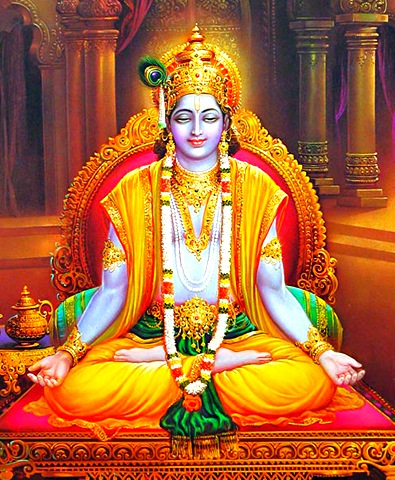 Yoga is as yoga does. The zeitgeist of yoga has become a sort of caricature or blurry copy. The appropriation, distortion and dilution of yoga has gotten ridiculous. We have yoga gimmicks like acro-yoga, aerial-yoga, beer-yoga, goat-yoga, rage-yoga, paddleboard-yoga and naked-yoga. The US patent office has over one thousand forms of designer yoga waiting for approval. Is it any wonder, the Western media treats all things yoga, as some sort of flakey, New Age hippy-shit when it is actually a symbiote of Hinduism?
Yoga is as yoga does. The zeitgeist of yoga has become a sort of caricature or blurry copy. The appropriation, distortion and dilution of yoga has gotten ridiculous. We have yoga gimmicks like acro-yoga, aerial-yoga, beer-yoga, goat-yoga, rage-yoga, paddleboard-yoga and naked-yoga. The US patent office has over one thousand forms of designer yoga waiting for approval. Is it any wonder, the Western media treats all things yoga, as some sort of flakey, New Age hippy-shit when it is actually a symbiote of Hinduism?If people want to do yoga without graduating to anything philosophical or psychological, they have every right not to do so. It’s also fine if they aren’t interested in anything spiritually transformative. Not all people are cut-out for higher awareness or enlightenment.
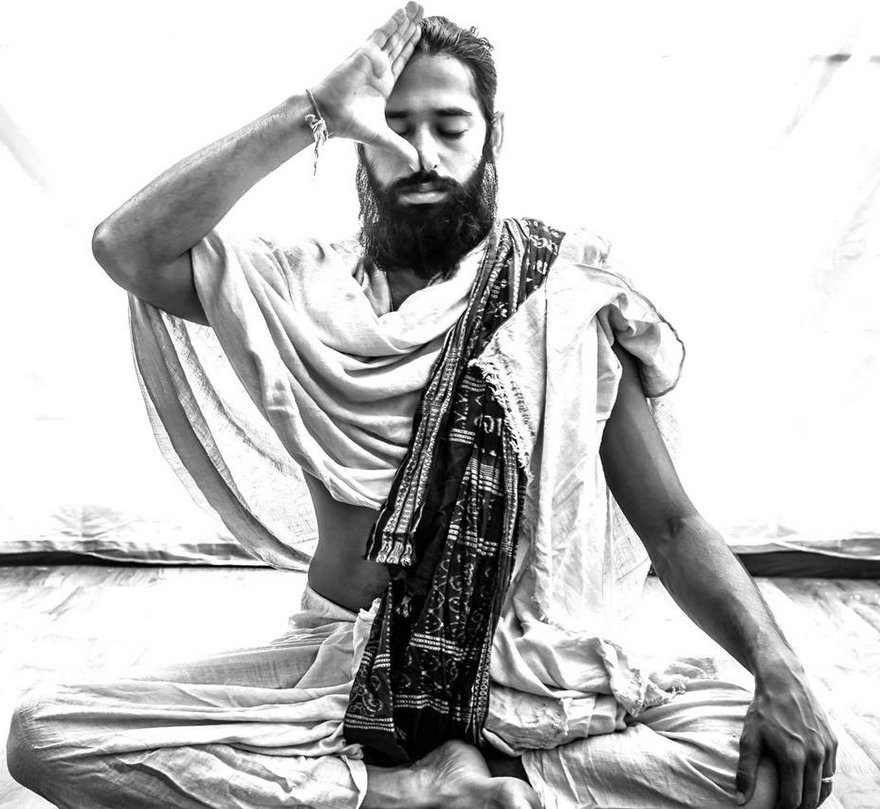 Just don’t deny that hundreds of millions of Hindus and Buddhists for that matter, have used yoga for such ambitions for thousands of years before it came to the West with Lululemon, Gold’s Gym, the YMCA, Yoga Journal or Yoga Alliance. From Hindu thought yoga arose, developed and evolved for just as long throughout many generations of guru/disciple lineages as well as through generational, parent to child tutelage.
Just don’t deny that hundreds of millions of Hindus and Buddhists for that matter, have used yoga for such ambitions for thousands of years before it came to the West with Lululemon, Gold’s Gym, the YMCA, Yoga Journal or Yoga Alliance. From Hindu thought yoga arose, developed and evolved for just as long throughout many generations of guru/disciple lineages as well as through generational, parent to child tutelage.
The word “yoga” first appears in the Rig Veda, which is known as the world’s oldest text and a Hindu scripture. If yoga has nothing to do with Hinduism, why does Hinduism have so much to do with yoga?
They will claim that yoga is not about Hinduism and pre-dates Hinduism, which is an unfortunate and faulty stance. The main reason they say this, is because it’s better for business. They don’t want to offend or scare away the Christian religious majority who are their current and potential paying students or rather, customers.
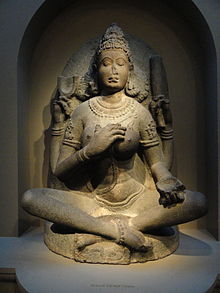
Though it may be true to say that yoga predates the word “Hinduism”, yoga does not predate the Hindu religion or the Sanatana Dharma that has its roots in the Indus and Sarasvati valley civilizations of ancient India. Perhaps asana and/or standing on you head has evolve in the West further than it had evolved in the East, but that is not yoga.
Patanjali’s Yoga Sutras claim that “asana” refers to one “comfortable and steady seated lotus pose and holding that position and attitude long enough to experience Dhyana or a meditative state. These sutras say that “asana”, literally translated as “seat”, is had by one with mastery over the outer body which leads to mastery over the inner mind and freedom from delusions and duality.
When Eastern religions and cultures are appropriated by well-meaning people in the Western world, it sets up a systematic degradation of billions of people past and present.
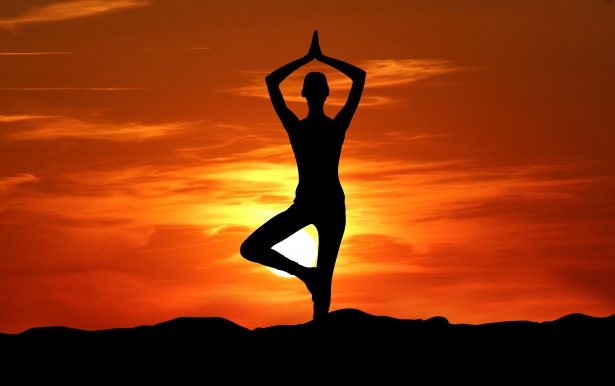 Many of these Western yogis are sorts of hidden Hindus themselves…even the ones who shun and mock Hinduism. Presently there are many in the West who have a copy of the Bhagavad Gita or the Yoga Sutras, practice some form of yoga and/or meditation, are ethical vegetarians, chant mantra, use Ayurvedic medicine, are into Vedic astrology and own malas and statues of the Buddha or Hindu deities.
Many of these Western yogis are sorts of hidden Hindus themselves…even the ones who shun and mock Hinduism. Presently there are many in the West who have a copy of the Bhagavad Gita or the Yoga Sutras, practice some form of yoga and/or meditation, are ethical vegetarians, chant mantra, use Ayurvedic medicine, are into Vedic astrology and own malas and statues of the Buddha or Hindu deities.
They have come to believe in and practice various aspects of Hinduism, with or without knowing so. They tend to believe in karma and reincarnation, yet they don’t seem to understand it much. The ramifications of their own actions, beyond that which is immediately apparent to them, seems lost.
 With karma, every thought has an immediate as well a potential effect. Appropriating Indic culture, religion and intellectual property is not karma-friendly. Now, many in the East are even succumbing to this ridiculous ideal of yoga as a franchise and a mere physical exercise, rather than a philosophy and a psycho-biological, metaphysical discipline or practicum. They conform to get in on the monetary action of the most current yoga trend, no matter its form or its qualities.
With karma, every thought has an immediate as well a potential effect. Appropriating Indic culture, religion and intellectual property is not karma-friendly. Now, many in the East are even succumbing to this ridiculous ideal of yoga as a franchise and a mere physical exercise, rather than a philosophy and a psycho-biological, metaphysical discipline or practicum. They conform to get in on the monetary action of the most current yoga trend, no matter its form or its qualities.
I’m not writing this for a good portion of American and European yoga instructors. Many in the West do take up, at least to some degree, traditional and comprehensive yoga.
They live the appropriate yogic lifestyle, whether they realize that it is a part of the Hindu way of life. I’m writing this to many who want to make yoga “Om free”. I’m writing this to the instructor who blatantly disregards the origins of, and the profound meaning of yoga which many find sacred.
 I’m writing to the ones who want to “de-Hinduize” yoga, as if that makes it better. or more relevant to the masses. If they want to take dharma and philosophy out of yoga, along with any aspect of Eastern spirituality and the Sanskrit language; then stop calling it “yoga”. The word “yoga” is itself Sanskrit.
I’m writing to the ones who want to “de-Hinduize” yoga, as if that makes it better. or more relevant to the masses. If they want to take dharma and philosophy out of yoga, along with any aspect of Eastern spirituality and the Sanskrit language; then stop calling it “yoga”. The word “yoga” is itself Sanskrit.
True Yoga is a limb of the Hindu Dharma, itself. It is often praised by such Western folks, while it’s true meaning and relevance is swirling down the toilet. It is being sold in one hour increments as a simple form of Indian postural sequencing. There are many Western yogis who are very much true.
I’m speaking now of the ones who are not. We care about endangered species. Let’s also care about endangered cultures, arts, sciences, techniques, philosophies and spiritual or religious practices. These also should never be lost in the name of idealism, modernity nor greed.
There have been and probably will always be dominant cultural majorities and sub-dominant or submissive cultural minorities. In India today, we can see the Hindu majority who are the submissive culture, due in part to there radical passivism. What is happening now with yoga is what has happened throughout history.
 A dominant culture kidnaps the cultural aspects and arts of a submissive culture and holds it for ransom, while making it into something it’s not…something trivial. Adopting other cultures along with diversity is great when done with equanimity, knowledge, understanding, compassion and respect. However, there is no justification for taking something away from a culture and a people that is sacred, and turning it into something that is irrelevant and irreverent for money or for egotistical purposes.
A dominant culture kidnaps the cultural aspects and arts of a submissive culture and holds it for ransom, while making it into something it’s not…something trivial. Adopting other cultures along with diversity is great when done with equanimity, knowledge, understanding, compassion and respect. However, there is no justification for taking something away from a culture and a people that is sacred, and turning it into something that is irrelevant and irreverent for money or for egotistical purposes.
Yoga arose and developed throughout many generations in India and its cultural realm, which is now more or less the entire globe, as yoga has become a worldwide phenomena. Hindus will still be practicing yoga as a form of their religion for a very long time after it has died out in the West…long after it was turned into something it never was meant to be. The West has for a very long while been taking what is sacred from the East, spinning it around to make money, renaming it and claiming it as their own invention.
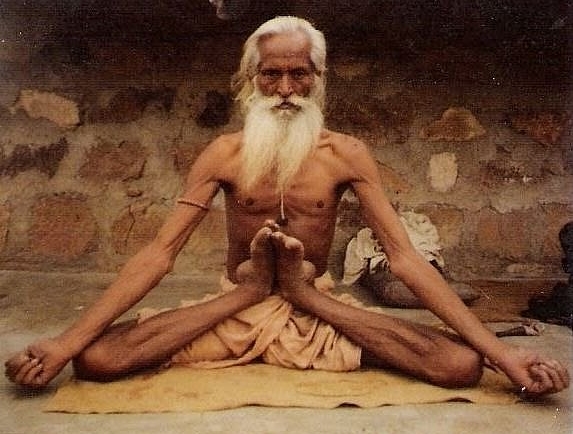 Yoga wasn’t always a cult of the body and went far beyond asana, breath and saying Om or Namaste without knowing what Om or Namaste means. This has nothing to do with ownership. No one owns yoga. It is about having respect for tradition, origins, lineage, teachings, culture and religion. It is about authenticity and truth. A few very powerful and influential organizations today are anti-Hindu including Islam, Christianity and the media in the West and in the East. Western yogis should not add to this Hindu dilemma or the dissolution of yoga as a form of dharma or spiritual tradition.
Yoga wasn’t always a cult of the body and went far beyond asana, breath and saying Om or Namaste without knowing what Om or Namaste means. This has nothing to do with ownership. No one owns yoga. It is about having respect for tradition, origins, lineage, teachings, culture and religion. It is about authenticity and truth. A few very powerful and influential organizations today are anti-Hindu including Islam, Christianity and the media in the West and in the East. Western yogis should not add to this Hindu dilemma or the dissolution of yoga as a form of dharma or spiritual tradition.
Why is it that yoga can be an experiential, psychological, spiritual and biological phenomenon but certainly not a religion? I will hear from contemporary yogis that yoga does not have origins in Hinduism, time and time again. It’s a popular thing to say these days. So then I’ll call it something else: ‘Yoga Dharma’ or ‘Yoga Spirituality’ or whatever clever name I can come up with to avoid having anything to do with the horrid Hindu religion or way of life.
 As a Hindu myself, why should i have to do this? Being Hindu is apparently a bad thing. Being religious in general is apparently a bad thing. It is considered to be a negative by some modern practitioners for some good reasons, but only the misinformed and presumptuous put all religions into the exact same category or under the exact same definition.
As a Hindu myself, why should i have to do this? Being Hindu is apparently a bad thing. Being religious in general is apparently a bad thing. It is considered to be a negative by some modern practitioners for some good reasons, but only the misinformed and presumptuous put all religions into the exact same category or under the exact same definition.
Different religions are after all, different…very different! The word “Religion” has indeed become a dirty word. Unfortunately, many trained to teach yoga in one hour increments, spread a lot of misinformation and stereotypes along the way. Some of this misinformation is at least insensitive and it does causes harm to some others, as well as to yoga itself. So much for Ahisma (radical pacifism). For that matter, so much for Satya (being an expression and an extension of truth). Apparently, these yogic concepts are forgotten.
Yoga has as many and as profound aspects, devotees, sages, texts, teachings and practices as any religion, if not more. I’ve been practicing it religiously for most of my life. It’s made me a better person, which is what religions are supposed to do. The very words ‘’yoga” and ‘’religion’’, have the same etymological definition; communion and union with that which is being perceived.
 Traditionally, that which is of the highest perception is regarded as the highest spiritual aspect some call God or the Spirit or one’s true Self. Yoga has been a path to communion, spirituality, higher awareness, knowledge, dynamic mindfulness, illumination and enlightenment for many hundreds of millions over an expansive amount of time.
Traditionally, that which is of the highest perception is regarded as the highest spiritual aspect some call God or the Spirit or one’s true Self. Yoga has been a path to communion, spirituality, higher awareness, knowledge, dynamic mindfulness, illumination and enlightenment for many hundreds of millions over an expansive amount of time.
Many people of all major religions do yoga and claim it makes them better Christians, Muslims, New Agers, Unitarians or whatever. Yet many of these same people will strongly deny it has anything to do with the Hindu religion.
So why can’t I just say that yoga is my religion? If I do, many other yogis call me delusional and ignorant. Yoga is a science of meditation and a philosophical system to be practiced in real life. It has appeared in Hinduism as the very essence of our spiritual practice since ancient times. If one completely divorces the Hindu dharma from yoga, it ceases to be yoga. Hinduism is lacking without bhakti, karma, jnana, kriya and raja yoga(s)…and yoga is lacking without its metaphysical and philosophical roots.
If yoga has nothing to do with the Hindu religion, why are the main yogic texts also Hindu texts: the Vedas, the Bhagavad Gita, the Tantric texts, the Upanishads and the Yoga Sutras? Even the Hatha Yoga Pradipika begins with an invocation to a Hindu deity.
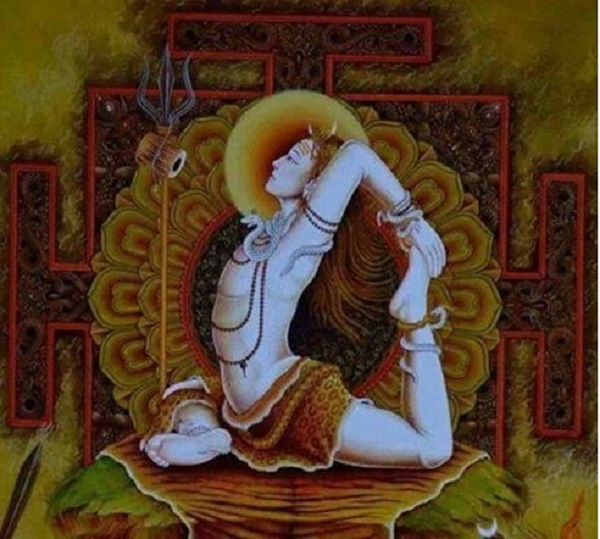 Why is Shiva, a Hindu Mega-god, known as the original Yogi and the King of Yogis? Why is Krishna, another Hindu mega-god, known as the teacher of yoga in the Bhagavad Gita? Why do Hindus considered him to be the avatar or Lord of Yoga? Why are the Yamas and Niyamas or preliminary codes of social and personal conduct, which are the basis of Hindu ethos, the first two limbs of Raja, Ashtanga or Pantanjala yoga?
Why is Shiva, a Hindu Mega-god, known as the original Yogi and the King of Yogis? Why is Krishna, another Hindu mega-god, known as the teacher of yoga in the Bhagavad Gita? Why do Hindus considered him to be the avatar or Lord of Yoga? Why are the Yamas and Niyamas or preliminary codes of social and personal conduct, which are the basis of Hindu ethos, the first two limbs of Raja, Ashtanga or Pantanjala yoga?
These are just traditional Hindu observances, which are a sorts of moral or ethical psychology that can be found in all other major religions. Why is the last Niyama “Isvara Pranidhana” or the surrender to Spirit, the divine consciousness or the Supreme personality of god?
Why does Patanjali use the words ”yoga” and ”samdhi”(absorption into the divine) interchangeably throughout his sutras? Many will still say that yoga has nothing to do with religion, is not a Hindu practice and goes beyond or magically transcends all religion(s) and is therefore superior to religion. I say this is incorrect, idealistic and myopic.
Just what is Western yoga now as opposed to traditional yoga? Many instructors and practitioners in the West don’t have an idea. Still, they often make the claim that yoga has been and will continue to evolve in the West and go beyond what it has already become to Hindus in both the East and the West.
 They equate the modernization of yoga, with the evolution of yoga. Sorry, but that makes no sense at all. Those saying such things have little idea about yoga’s radical or evolution through time or even true yoga itself.
They equate the modernization of yoga, with the evolution of yoga. Sorry, but that makes no sense at all. Those saying such things have little idea about yoga’s radical or evolution through time or even true yoga itself.
One would think this would be among the first things they learn in yoga-teacher’s training. In the West we have these yoga systems, organizations, conferences, festivals, federations, schools, competitions, photo-shoots, immersions and other toys in the hands of neophytes who have made a game of Eastern spirituality. I wonder if they even know the definition of the word “yoga” or for that matter, the definition of the word “appropriation”.
Some know the “how” of yoga, but not many know the “why” of yoga; and without knowing the “why”, the “how” is going to become lost and eventually won’t matter. During their teacher’s training they were probably exposed to Patanjali’s Yoga Sutras, but how many instructors can even recite the 5 Yamas or the 5 Niyamas?
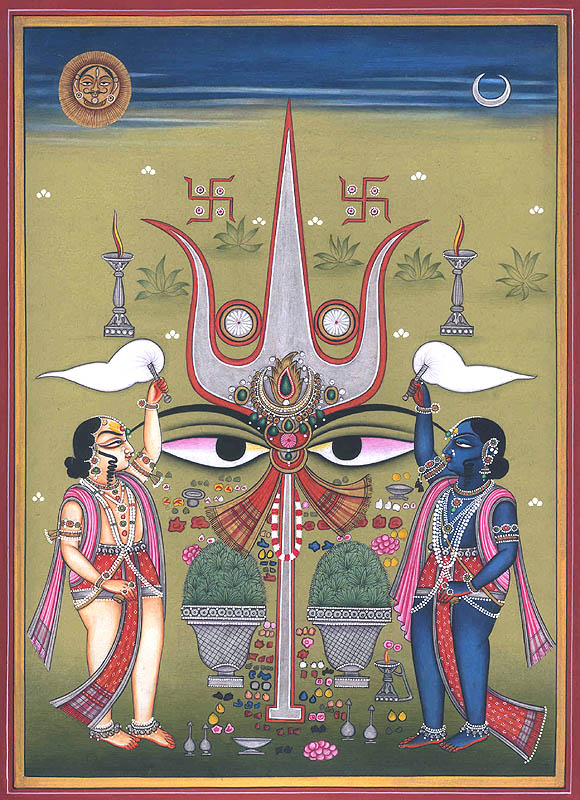 The few who can, can’t expound upon the spiritual, philosophical or psychological aspects of these sutras or basic limbs, nor on their simple and practical applications. Actually if one is not at least a little familiar with Ayurvedic medicine, tantra, the Bhagavad Gita, Hindu Dharma or the philosophical schools of Vedanta and Samkhya, is one truly a yogi?
The few who can, can’t expound upon the spiritual, philosophical or psychological aspects of these sutras or basic limbs, nor on their simple and practical applications. Actually if one is not at least a little familiar with Ayurvedic medicine, tantra, the Bhagavad Gita, Hindu Dharma or the philosophical schools of Vedanta and Samkhya, is one truly a yogi?
Western yoga instructors refer to themselves and even their students as yogis. Some refer to their teachers as gurus. These aren’t accurate descriptions but only quips that appeal to the ego. What’s worse might be the fact that many Hindus are not familiar with such aspects of their own Yoga-Dharmic tradition that is the very essence of their religion and way of life.
This is the result of the caricature, trend or zeitgeist yoga has become which has replaced authenticity, discipline and tradition. The profound-conventional is becoming lost in the mundane-contemporary.
 Patanjali’s wonderful aphorisms that make up the Yoga Sutras are not actually a primary or even a secondary text on yoga. Yoga’s primary text is without question the Bhagavad Gita. Secondarily are the Upanishads. Then may come the Tantras. Let’s not forget about the Vedas and the great epics of Hinduism(the Ramayana & the Mahabharata) themselves.
Patanjali’s wonderful aphorisms that make up the Yoga Sutras are not actually a primary or even a secondary text on yoga. Yoga’s primary text is without question the Bhagavad Gita. Secondarily are the Upanishads. Then may come the Tantras. Let’s not forget about the Vedas and the great epics of Hinduism(the Ramayana & the Mahabharata) themselves.
Then, or somewhere throughout there, come the Yoga Sutras. If one is going to teach hatha yoga, one might think of studying it beyond the scope of asana and pranayama, as hatha yoga is a preliminary practice to the practice of raja yoga which is meditation-centric, not asana-centric.
I understand that everyone starts from where they are and that what feels good and is simple, sells. There’s nothing wrong with that however, I am challenging the individual who calls him or herself a yogi, to go deeper. True yoga is beautiful in its simplicity as well as it is, in its complexities. I don’t think that everyone must know what I know. I don’t think every yogi needs to be a bhakta or devoted to some concept of “god” or “gods”.
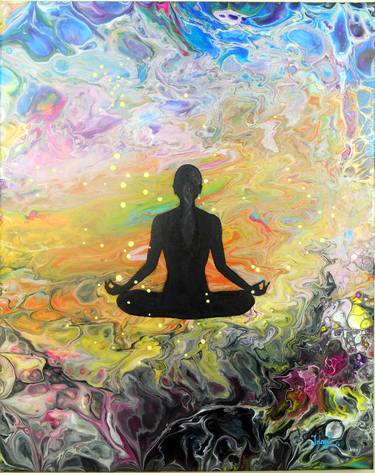 Actually, a Hindu doesn’t have to be a bhakta either. As a teenager I decided to devote my studies and devotion to Hindu Sanatana Dharma and its related topics. It’s been over 30 years later, and I still know very little of what there is to know. I intend to be a student until the day I die. Is it asking too much for the Western practitioners of yoga to just keep it real? That goes for the Eastern practitioner as well.
Actually, a Hindu doesn’t have to be a bhakta either. As a teenager I decided to devote my studies and devotion to Hindu Sanatana Dharma and its related topics. It’s been over 30 years later, and I still know very little of what there is to know. I intend to be a student until the day I die. Is it asking too much for the Western practitioners of yoga to just keep it real? That goes for the Eastern practitioner as well.
I’ll keep on trying not to separate them but to bring them together. My article here is not seeking separation but union which is after all, what yoga is truly about. It’s still kind of funny that in the East a yogi is a nomadic renunciate and ascetic, a mystic and a Vedic scholar of some sorts. While in the West, a yogi is someone who just wants fit into their skinny jeans.
I don’t mean to be a flippant “yoga snob” or any sort of elitist. I’m not a Hindu purest but I am a yoga purist, and I just often wonder about the credibility of modern yoga. I wonder where it is going, when it doesn’t seem to know where it has been.
 “According to the philosophy of Yoga, the physical body is a manifestation of consciousness. It is a crystallization of Karmic (behavioral) patterns created in the mind. The key to working with the body therefore, is to understand the consciousness behind it, much of which lies outside our ordinary awareness. This requires that we actually practice (comprehensive) yoga”. Dr. David Frawley and or Pandit Vamadeva Shastraji of the American Institute of Vedic Studies, NM USA
“According to the philosophy of Yoga, the physical body is a manifestation of consciousness. It is a crystallization of Karmic (behavioral) patterns created in the mind. The key to working with the body therefore, is to understand the consciousness behind it, much of which lies outside our ordinary awareness. This requires that we actually practice (comprehensive) yoga”. Dr. David Frawley and or Pandit Vamadeva Shastraji of the American Institute of Vedic Studies, NM USA seeking of knowledge and the spirit, than anything else, see?” Swami Rama of the Himalayan Institute PA USA
seeking of knowledge and the spirit, than anything else, see?” Swami Rama of the Himalayan Institute PA USA texts address the relation between the two quite often. To paraphrase: The roots of Yoga, its scriptural origins, are Hindu. The stem of Yoga, its practice, discipline or sadhana, is Hindu. The flower of Yoga, its mystical union with god or cosmic consciousness is Hindu. Yoga in its full glory and proper definition is fully Hindu.”~Satguru Sivaya Subramuniyaswami of Hinduism Today Magazine HI USA
texts address the relation between the two quite often. To paraphrase: The roots of Yoga, its scriptural origins, are Hindu. The stem of Yoga, its practice, discipline or sadhana, is Hindu. The flower of Yoga, its mystical union with god or cosmic consciousness is Hindu. Yoga in its full glory and proper definition is fully Hindu.”~Satguru Sivaya Subramuniyaswami of Hinduism Today Magazine HI USA Yoga is the everlasting, primal, revealing, the archetypal light…the sacrifice that elevates us…the selfless performance of actions in union with all of life…the heightened sensitivity and awareness of life’s wonder and beauty…the fearless illuminating journey that does not end with death…the connection with the Universe and eternal realms of manifestation through our own eternal capacity to love.~ The Bhagavad Gita Sri Krishna use the word ‘yoga’ over 100 times in the Bhagavad Gita, both as a noun and a verb.
